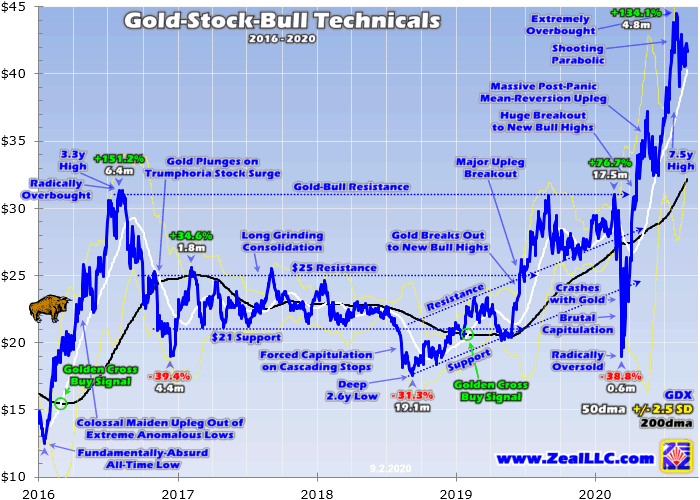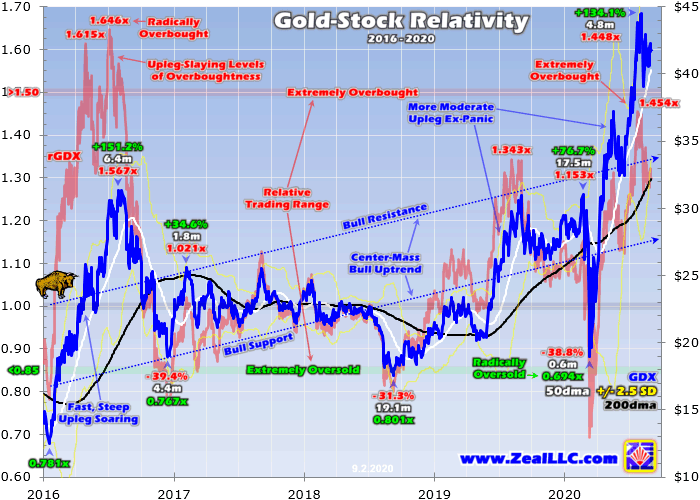The gold miners’ stocks are mired in correction mode, which isn’t surprising after their mighty post-stock-panic upleg. Huge buying catapulting them higher left this sector extremely overbought. Corrections are normal and healthy after prices get too stretched technically. They eradicate upleg toppings’ excessive greed, rebalancing sentiment. That paves the way for bulls’ next uplegs, and offers great buying opportunities.
The most-popular gold-stock benchmark today is the GDX VanEck Vectors Gold Miners ETF. It includes the world’s biggest and best gold miners, dwarfing its peers in size. Launched way back in May 2006, GDX’s first-mover advantage has grown insurmountable. This ETF’s $17.9b in net assets this week are running 31.4x larger than its next biggest competitor’s in the 1x-long major-gold-miners-ETF space. GDX is king.
Gold stocks have a well-deserved reputation for excessive volatility, which is a key reason they are so alluring. When the stars align right for them, meaning a big and persistent gold upleg, their stock prices skyrocket! We just witnessed that in this sector’s enormous upleg following March’s COVID-19-lockdown-fueled stock panic. The subsequent gold-stock gains were among the largest out of all stock-market sectors.
As gold temporarily got sucked into that stock panic, GDX was pummeled to a deep low of just $19.00. Those radically-oversold conditions gave the gold stocks massive room to mean revert far higher. And that’s exactly what they did over the following 4.8 months into early August, where GDX rocketed a stupendous 134.1% higher! Contrarian traders who bought in soon after the stock panic multiplied their capital.
But such colossal gains in such a short span generated incredible greed, and left GDX way overextended technically. So over the next 4 trading days into mid-August, GDX corrected 12.2%. Since then it has been consolidating high, meandering in a tight trading range between that upleg top and initial correction low of $44.48 and $39.05. Until GDX powers to new bull-market highs, it technically remains in correction mode.
Many if not most traders hate these necessary selloffs after bull-market uplegs. Unlike powerful rallies to major new highs, corrections aren’t any fun. But they do offer the best opportunities to buy relatively low in ongoing bull markets. Bulls’ inevitable alternating series of uplegs followed by corrections also greatly expand their tradable gains. Correction bottomings are when to buy low before later selling high at upleg toppings.
Because GDX has spent the past 6 weeks or so mostly drifting in the low $40s, those levels increasingly feel normal. But they are actually quite high in the context of this 4.6-year-old gold-stock bull. This first chart shows the whole thing through the GDX lens. Gold stocks have run really far really fast thanks to that huge post-panic upleg! That’s a big reason why they stalled out in early August to start correcting.

Relative to their bull market, the major gold stocks shot parabolic in recent months. The tail end of that gargantuan 134.1% upleg went vertical, leaving GDX extremely overbought at a 7.5-year secular high! This leading sector benchmark soared way above both its 200-day moving average and 50-day moving average, rendered in black and white here. There’s no doubt gold stocks are really stretched technically.
When any prices surge too far too fast, they stoke excessive popular greed. Traders rush in to chase the quick gains, expecting them to persist indefinitely. But pulling forward big buying rapidly exhausts traders’ available capital firepower. Soon everyone who wants to buy in anytime soon has already fully deployed their limited funds in the red-hot sector. Only sellers remain, and they soon overpower the dwindling buying.
The building selling momentum fuels corrections, which work off technical overboughtness while bleeding away excess greed. The gold-stock realm is like Texas, everything is bigger there! So corrections are as outsized as uplegs, making them nothing to be trifled with. Looking at the upleg-correction cycles so far in this secular gold-stock bull offers important insights into what is likely in our current young correction.
Gold stocks’ massive post-stock-panic soaring this year was this bull’s fourth upleg. All four averaged hefty 99.2% gains over 7.6 months. The first three uplegs were followed by corrections clocking in at a serious mean of 36.5% over 8.0 months. If today’s fourth correction rises to that bull-market precedent, it would batter GDX all the way back down to $28.24! That’s a heck of a long ways farther down from here.
But for a variety of reasons, the gold stocks probably won’t have to collapse so far this time around before adequately rebalancing sentiment. This gold-stock bull’s first three corrections were each dragged down to more-severe levels by unusual events. The first and largest one into late 2016 grew anomalously big after Trump’s surprise election win. Gold and gold stocks were shunned as stock markets surged on tax-cut hopes.
The second correction into late-summer 2018 was exacerbated by extreme speculator positioning in gold futures, driving rare cascading stop-loss selling. And of course the third one earlier this year was driven by a full-blown stock panic, which are normally only seen about once a century. Typical corrections in gold-stock bulls run closer to 20% to 30%, which we can call 25%. That’s much less painful than 37%.
Because of gold miners’ high inherent profits leverage to gold prices, gold-stock corrections tend to mirror and amplify gold’s own. The major gold stocks dominating GDX usually exaggerate gold’s own upleg-correction cycles by 2x to 3x. And of course gold is much less volatile than its miners’ stocks. So a normal 10% gold correction multiplied by 2x to 3x yields that same 20%-to-30% correction range, averaging 25%.
25% off of early August’s euphoric gold-stock peak would drag GDX down to $33.36. That is still way under this past month’s lower-$40s drift. Interestingly that would also push GDX back down near its 200-day moving average, which is running $32.15 as of the middle of this week. 200dmas happen to be the highest-probability bottoming zones technically for bull-market corrections without exacerbating factors.
A GDX 200dma approach today would likely signal the end of this necessary rebalancing correction. That is the ideal time to buy relatively low, aggressively redeploying in beaten-down gold stocks. While no one knows in advance how closely GDX will retreat to its 200dma, the closer it gets the better the odds this correction has largely run its course. Considering price levels compared to their 200dmas is a great trading tool.
I’ve been researching this key technical relationship for a couple decades now, and actively trading gold stocks based on it with great success. I call this method Relativity Trading, since it looks at gold-stock price levels relative to their 200dmas. This simple-yet-powerful relationship can be quantified by dividing GDX’s daily closes by their current 200dmas. That yields the Relative GDX indicator, or rGDX for short.
Charted over longer periods of time, this rGDX ratio forms horizontal trading ranges. They effectively reveal how overbought or oversold gold-stock prices are, which are the best times to sell high and buy low. This rGDX chart tracks this multiple during this gold-stock bull to date. Visualize Relativity charts as flattening out 200dmas to 1.00x, and recasting price action around that in comparable constant-percentage terms.

Relativity trading ranges are based off the past 5 calendar years’ price action. The Relative GDX has mostly meandered between 0.85x to 1.50x during this span, which coincides with this secular gold-stock bull. Gold stocks are extremely oversold when the rGDX falls under 0.85x. At mid-March’s stock-panic low, this metric plunged to a radically-oversold 0.694x! So we backed up the truck to aggressively buy then.
While our specific stock trades are only recommended to our paying newsletter subscribers graciously keeping us in business, I did flag that incredible buy-low opportunity publicly in a weekly essay in early April. Published on April 3rd when GDX was still under $25, I warned “All this argues that a major new gold-stock upleg is getting underway, portending big gains coming!” and “the gold stocks will power far higher.”
While extreme technicals and sentiment alone supported that bold contrarian call, so did gold miners’ amazing fundamentals. Higher prevailing gold prices guaranteed much-higher profits for the gold stocks, which indeed came to pass. Several weeks ago I did a deep quarterly dive into the actual Q2 operational and financial results of the major GDX gold miners. Sector-wide implied earnings soared 66.2% YoY last quarter!
But after GDX skyrocketed 134.1% in just 4.8 months out of those crazy stock-panic lows, that left gold stocks extremely overbought. That rGDX indicator stretched as high a 1.454x in late July, and was still way up at 1.448x when the major gold stocks crested in early August. In other words, GDX stretched a massive 45% over its 200-day moving average! That was challenging the 50%+ extremely-overbought levels.
Overboughtness is a short-term technical condition totally independent from underlying fundamentals that govern longer-term gold-stock fortunes. Once gold stocks run too far too fast exhausting all near-term buying potential, they need to correct no matter how profitable mining gold is. Excessive greed still needs to be bled away to rebalance sentiment. And excessively-extended technicals need to mean revert back to norms.
And that is exactly what has started happening in this sector over the past month since GDX peaked. The rGDX plunged as low as 1.259x in mid-August as GDX’s initial sharp 12.2% 4-trading-day selloff bottomed. Since then GDX has drifted around 31% above its 200dma, with the rGDX running 1.299x in the middle of this week. While way less overbought than 45%, 31% remains far above the correction-ending 0%.
Extreme overboughtness can be worked off two ways, correcting or consolidating. Gold stocks can either sell off fast enough to mean revert back near their 200dma, or they can drift sideways long enough for that 200dma to catch up. While investors prefer the lower volatility and milder selloffs of consolidations, faster corrections are much more beneficial to speculators. They usher in superior buy-low opportunities quicker.
While GDX did plunge into formal correction territory over 10% in those initial days after it crested in early August, the gold-stock price action since has been more consolidation-like. But consolidations can morph into corrections at any time, depending on what gold stocks’ dominant primary driver gold does. GDX can still easily slump into a bigger correction here, likely much closer to 25% than the mild 12% seen so far.
Gold’s own overboughtness relative to its 200dma in early August proved far more extreme than the gold stocks’. The rGold indicator soared to nosebleed heights of 1.260x, an 8.9-year high! The last time gold was so overextended technically was back in September 2011 soon after its previous secular bull had peaked. That extreme exhausted gold’s bull, birthing a bear that would crush it 44.5% lower in the next 4.3 years.
While gold’s current secular bull isn’t likely to fail yet for plenty of fundamental and sentimental reasons outside the scope of this essay, gold really needs to correct after such epic overboughtness! But at worst so far after peaking in early August, gold only dropped 7.5% in this selloff’s initial few trading days. It is hard to imagine it not falling into 10%+ correction territory given those crazy technical and sentimental extremes.
A 10% gold selloff would drag this metal back down near $1856, which is another 4.5% lower from where it was trading in the middle of this week. And if the gold stocks amplify gold’s losses by that usual 2x to 3x, that extends GDX’s correction near 25%. While seeing GDX back down near $33.36 is no big deal at all in gold-stock-bull context, that is still another 20.1% lower than its mid-week prevailing level of $41.76!
With the major gold stocks undeniably in a correction, why buy now if they are likely to drift or plunge still another 20% or so lower before it bottoms? Trading, both speculation and investment which only differ by time horizons, is all about buying low then later selling high. The best times to buy relatively low within ongoing bull markets is when corrections have largely run their courses. GDX is nowhere near that point yet.
GDX has to retreat closer to its 200dma, which will be evident in that rGDX indicator and normal charts. This leading gold-stock ETF doesn’t necessarily have to fully return to its 200-day moving average, but it has to get a heck of a lot closer than 30% above. Plenty of other factors will help determine when to resume pulling the trigger on buying fundamentally-superior gold stocks, which I discuss constantly in our newsletters.
But whenever and wherever this gold-stock correction bottoms, the gold miners’ fundamentals continue to strongly support another major bull-market upleg. Once sentiment is rebalanced and technicals are no longer stretched, gold stocks’ upside potential in the subsequent months is massive. So I’m really looking forward to redeploying hand over fist into excellent gold miners once the necessary green lights flash.
My recent essay on the GDX gold miners’ Q2 results dove deeply into their fundamentals. You ought to read that if you missed it a few weeks ago. But in a nutshell, here’s the current situation. With Q3’20 now 2/3rds over, gold has already averaged an all-time-record high $1910. Even if we assume gold corrects hard enough in the rest of Q3 to drag that average down to $1875, that is wildly profitable for gold miners.
Over the past four reported quarters, the GDX gold miners averaged all-in sustaining costs of $933 per ounce. AISCs are actually likely to fall in Q3 with gold output rebounding following Q2’s shrinkage from government-imposed national lockdowns. But at $1875 gold and $933 AISCs, the major gold miners are on track to earn a colossal $942 per ounce in this current quarter. That would surge 59.5% from Q3’19 levels!
So the gold stocks still have big bull-market gains to come after they weather this necessary and healthy correction. Even after that enormous 134.1% post-stock-panic upleg, additional massive upside is still fundamentally justified in this contrarian sector! Higher prevailing gold prices drive much-higher earnings for the gold miners, which ultimately support much-higher stock prices. Those come gradually over time in bulls.
All bull markets naturally flow then ebb, taking two steps forward before retreating one step back. Their price action gradually meanders around uptrends. This normal upleg-correction pattern keeps sentiment balanced, extending bull markets’ longevity. And it is a huge boon for traders, offering excellent mid-bull opportunities to buy relatively low before later selling relatively high. That greatly expands bulls’ potential gains!
At Zeal we started aggressively buying and recommending fundamentally-superior gold and silver miners in our weekly and monthly subscription newsletters back in mid-March right after the stock-panic lows. We layered into dozens of new positions before gold stocks grew too overbought, which were stopped out recently at huge realized gains running as high as +199%! Our subscribers multiplied their wealth within months.
To profitably trade high-potential gold stocks, you need to stay informed about their technicals, sentiment, and fundamentals. And what is moving gold, their dominant primary driver. Our popular newsletters are a great way. They draw on my vast experience, knowledge, wisdom, and ongoing research to explain what’s going on in the markets, why, and how to trade them with specific stocks. Subscribe today and take advantage of our 20%-off sale! Corrections are the time to do your gold-stock homework, preparing to redeploy as they pass.
The bottom line is gold stocks are in correction mode. They shot parabolic into early August, surging too far too fast exhausting the capital firepower available for near-term buying. Then they quickly plunged into a mild correction, which has morphed into a high consolidation since. But with gold stocks remaining very overbought technically, and greed still elevated after an insufficient selloff, a resurgent correction is likely.
That could easily extend to 25% in GDX, another 20% lower from this week’s levels. The depth of this necessary and healthy rebalancing selloff for gold stocks depends on what happens in gold. The larger gold’s own correction, the farther the amplifying gold stocks will drop. But bigger and faster is better for traders, yielding much-better buy-low opportunities sooner than if gold stocks instead keep drifting sideways.
Adam Hamilton, CPA
September 4, 2020
Copyright 2000 - 2020 Zeal LLC (www.ZealLLC.com)

